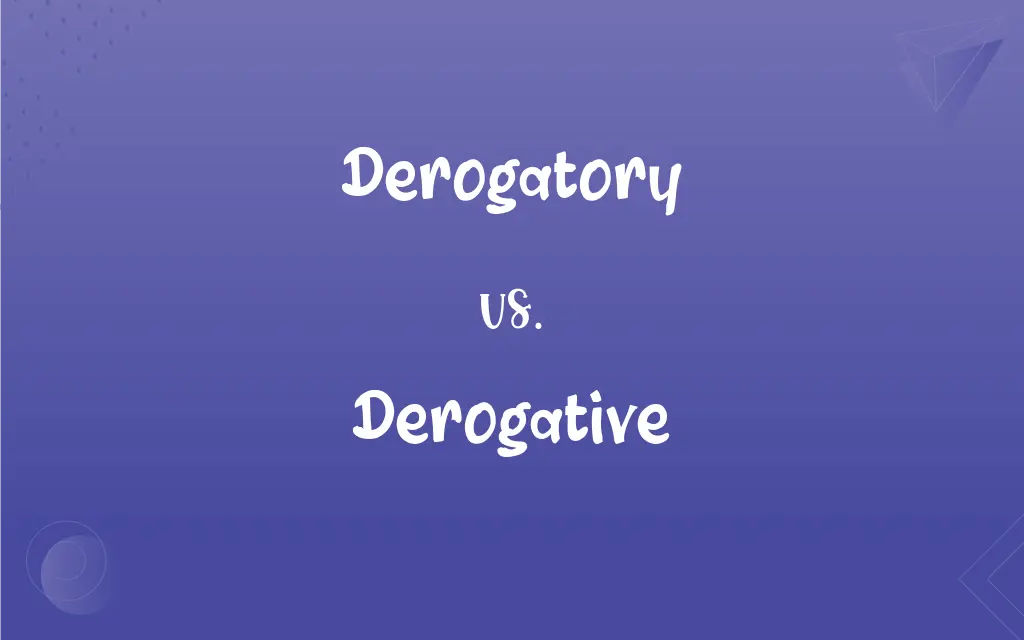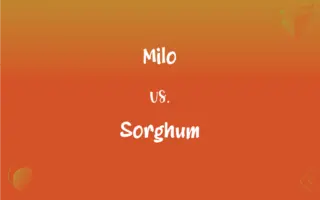Derogatory vs. Derogative: What's the Difference?
Edited by Aimie Carlson || By Harlon Moss || Updated on November 2, 2023
Derogatory means showing a critical or disrespectful attitude; derogative is less common and often means the same, functioning more as a variant.

Key Differences
Derogatory and derogative both pertain to expressions that belittle or disparage someone or something. "Derogatory" is commonly used to describe remarks, terms, or attitudes that are insulting or meant to demean. It implies a tone or remark that lessens the worth or reputation of the subject it describes. For example, calling a professional meeting a "little get-together" could be considered derogatory, as it trivializes its importance.
Derogative is less frequently used but typically conveys a similar meaning. It denotes speech or behavior that diminishes or devalues someone or something. Some language purists distinguish "derogative" as pertaining to rights and privileges, suggesting a reduction or removal, but in modern usage, this distinction is not strictly observed.
The difference between these words often comes down to usage rather than meaning. "Derogatory" is the preferred term in most contexts, especially when describing speech or actions that are demeaning or offensive. "Derogative," while understood, appears less frequently and can be seen as a more archaic or formal variant of "derogatory."
"Derogatory" has a stronger presence in legal and social contexts, where it is used to describe language that might contribute to a hostile environment or defamation. Meanwhile, "derogative" might be used more in academic or philosophical discussions, although it's often interchangeable with "derogatory."
Both "derogatory" and "derogative" stem from the Latin "derogare," meaning to repeal or abrogate partially. This origin is reflected in how both terms imply a reduction, either of someone's dignity in the case of "derogatory" or of rights and privileges, which can be a secondary meaning of "derogative."
ADVERTISEMENT
Comparison Chart
Commonness
More commonly used
Less common, more archaic
Context
Often used in legal and social contexts
Appears in more formal or philosophical texts
Meaning
Disrespectful, demeaning
Reductive, potentially demeaning
Usage in Speech
Refers to insulting or belittling remarks
Sometimes used interchangeably with derogatory
Nuance
Specifically demeaning to dignity or reputation
Occasionally implies a reduction of rights or privileges
ADVERTISEMENT
Derogatory and Derogative Definitions
Derogatory
Demeaning or devaluing.
He received a warning for his derogatory language.
Derogative
Showing a critical or disrespectful attitude.
His speech had a surprisingly derogative tone.
Derogatory
Belittling or disparaging.
Using such a derogatory term is unacceptable.
Derogative
Implies a diminishment, especially of dignity or importance.
The derogative statement diminished the significance of the achievement.
Derogatory
Reductive of someone’s status or reputation.
The article made several derogatory references to the actor's past.
Derogative
Expressing a reduction in worth or status.
The derogative comment was uncalled for during the discussion.
Derogatory
Offensive or contemptuous.
That comment was highly derogatory and unprofessional.
Derogative
Intended to belittle or disparage.
Using derogative language in the workplace is prohibited.
Derogatory
Disrespectful or insulting.
Her remarks were considered derogatory by the committee.
Derogative
Reflecting a negative judgment or evaluation.
The review was not only negative but derogative of the entire genre.
Derogatory
Disparaging; belittling
A derogatory comment.
Derogative
Tending to derogate; detractive.
Derogatory
Tending to detract or diminish.
FAQs
Is "derogatory" always negative?
Yes, it conveys criticism or disrespect.
Can a gesture be derogatory?
Yes, non-verbal actions can also be considered derogatory.
Is "derogative" commonly found in modern text?
It's less common and considered somewhat archaic.
Do "derogatory" and "derogative" differ in intensity?
Not significantly, but "derogatory" is more likely to be used in strong condemnation.
Are these terms only used for speech?
They primarily describe speech or writing but can refer to any demeaning action.
Is "derogatory" used in legal contexts?
Yes, particularly concerning defamation or discrimination.
Is "derogatory" acceptable in formal writing?
Yes, when referring to disrespectful or demeaning comments.
Can "derogatory" imply a legal offense?
Yes, especially if it involves slander or libel.
Can either term describe an attitude?
Yes, both can refer to a dismissive or demeaning attitude.
Can "derogative" be used instead of "derogatory"?
While less common, "derogative" is sometimes used as a synonym for "derogatory."
Do they have the same etymology?
Yes, both come from the Latin word "derogare."
Are "derogatory" remarks considered harassment?
They can be if they contribute to a hostile environment.
Can either term be neutral?
No, both have negative connotations.
Are these terms related to derogation in law?
Yes, they share the concept of diminishing value or rights.
Can "derogatory" refer to self-deprecation?
Yes, one can make derogatory remarks about oneself.
Does "derogative" have an alternative meaning?
Historically, it sometimes referred to the reduction of rights or privileges.
Can "derogative" be positive?
No, it's also used in a negative context.
Is "derogatory" only for personal insults?
No, it can also refer to groups or concepts.
Can "derogative" comments damage reputation?
Yes, similar to "derogatory," they can be harmful.
Is it derogatory to use stereotypes?
Stereotyping can be derogatory if it belittles a group or individual.
About Author
Written by
Harlon MossHarlon is a seasoned quality moderator and accomplished content writer for Difference Wiki. An alumnus of the prestigious University of California, he earned his degree in Computer Science. Leveraging his academic background, Harlon brings a meticulous and informed perspective to his work, ensuring content accuracy and excellence.
Edited by
Aimie CarlsonAimie Carlson, holding a master's degree in English literature, is a fervent English language enthusiast. She lends her writing talents to Difference Wiki, a prominent website that specializes in comparisons, offering readers insightful analyses that both captivate and inform.
































































